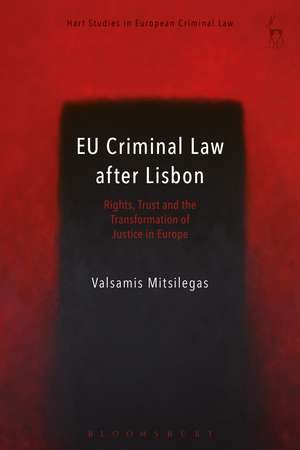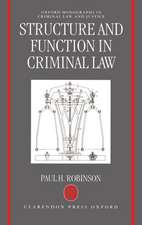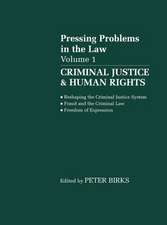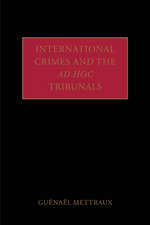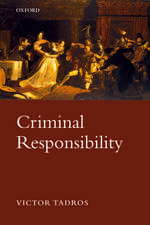EU Criminal Law after Lisbon: Rights, Trust and the Transformation of Justice in Europe: Hart Studies in European Criminal Law
Autor Valsamis Mitsilegasen Limba Engleză Hardback – 29 iun 2016
| Toate formatele și edițiile | Preț | Express |
|---|---|---|
| Paperback (1) | 147.01 lei 3-5 săpt. | +23.91 lei 6-12 zile |
| Bloomsbury Publishing – 17 oct 2018 | 147.01 lei 3-5 săpt. | +23.91 lei 6-12 zile |
| Hardback (1) | 500.52 lei 6-8 săpt. | |
| Bloomsbury Publishing – 29 iun 2016 | 500.52 lei 6-8 săpt. |
Din seria Hart Studies in European Criminal Law
-
 Preț: 147.01 lei
Preț: 147.01 lei - 28%
 Preț: 374.46 lei
Preț: 374.46 lei - 22%
 Preț: 264.45 lei
Preț: 264.45 lei -
 Preț: 306.94 lei
Preț: 306.94 lei - 30%
 Preț: 607.18 lei
Preț: 607.18 lei - 30%
 Preț: 567.99 lei
Preț: 567.99 lei - 18%
 Preț: 322.33 lei
Preț: 322.33 lei - 34%
 Preț: 511.97 lei
Preț: 511.97 lei - 18%
 Preț: 322.80 lei
Preț: 322.80 lei - 22%
 Preț: 272.23 lei
Preț: 272.23 lei - 22%
 Preț: 270.57 lei
Preț: 270.57 lei - 18%
 Preț: 322.60 lei
Preț: 322.60 lei - 30%
 Preț: 571.66 lei
Preț: 571.66 lei - 27%
 Preț: 409.90 lei
Preț: 409.90 lei - 30%
 Preț: 835.93 lei
Preț: 835.93 lei - 22%
 Preț: 257.97 lei
Preț: 257.97 lei - 18%
 Preț: 306.94 lei
Preț: 306.94 lei - 18%
 Preț: 308.74 lei
Preț: 308.74 lei - 18%
 Preț: 306.47 lei
Preț: 306.47 lei - 18%
 Preț: 323.84 lei
Preț: 323.84 lei - 22%
 Preț: 273.06 lei
Preț: 273.06 lei - 18%
 Preț: 300.98 lei
Preț: 300.98 lei - 18%
 Preț: 299.55 lei
Preț: 299.55 lei - 18%
 Preț: 299.01 lei
Preț: 299.01 lei
Preț: 500.52 lei
Preț vechi: 690.26 lei
-27% Nou
Puncte Express: 751
Preț estimativ în valută:
95.78€ • 102.42$ • 79.85£
95.78€ • 102.42$ • 79.85£
Carte tipărită la comandă
Livrare economică 17 aprilie-01 mai
Preluare comenzi: 021 569.72.76
Specificații
ISBN-13: 9781849466486
ISBN-10: 1849466483
Pagini: 336
Dimensiuni: 138 x 216 x 12 mm
Greutate: 0.64 kg
Editura: Bloomsbury Publishing
Colecția Hart Publishing
Seria Hart Studies in European Criminal Law
Locul publicării:London, United Kingdom
ISBN-10: 1849466483
Pagini: 336
Dimensiuni: 138 x 216 x 12 mm
Greutate: 0.64 kg
Editura: Bloomsbury Publishing
Colecția Hart Publishing
Seria Hart Studies in European Criminal Law
Locul publicării:London, United Kingdom
Caracteristici
This timely book provides the first detailed overview of the impact of the Lisbon Treaty reforms on the operation and scope of EU criminal law.
Notă biografică
Valsamis Mitsilegas is Head of the Department of Law, Professor of European Criminal Law and Director of the Criminal Justice Centre at Queen Mary, University of London.
Cuprins
1. Introduction 2. The Constitutionalisation of EU Criminal Law After Lisbon 3. Defining EU Competence in Substantive Criminal Law: From Securitised to Functional Criminalisation 4. The Rocky Road to European Prosecution: Caught Between Co-ordination and Centralisation 5. Mutual Recognition and Mutual Trust in Europe's Area of Criminal Justice: The Centrality of Fundamental Rights 6. Legislating for Human Rights: The EU Legal Framework on the Rights of Individuals in Criminal Proceedings 7. The Place of the Victim in Europe's Area of Criminal Justice 8. The Uneasy Relationship Between EU Criminal Law and Citizenship of the Union 9. The European Union and Preventive Justice. The Case of Terrorist Sanctions 10. Conclusion. Placing the Individual at the Heart of European Criminal Justice
Recenzii
This book presents a rich, detailed, comprehensive, yet at the same time coherent and manageable analysis. The book is characterized by a lucid and analytical writing style, and has many valuable references to the academic literature. Its critical engagement with the literature make it useful not only for established scholars in the field, but also for (graduate) students looking for inspiration for research projects. It is a highly valuable contribution to the study of European criminal law.
...this latest monograph by Mitsilegas must be praised both in content for the sophistication of the analysis and, which is not always the case with scientific publications, also in style for the use of clear language and for the linearity of its arguments...EU Criminal Law after Lisbon represents a landmark publication in the field, an essential read for anyone wishing to carry out any quality research in this ever changing and growing field of law.
EU Criminal Law after Lisbon is a critical analysis of EU criminal law that should find itself on the bookshelves of any lawyer interested in the this everdeveloping and increasingly important area of the law ... It is difficult to capture in the space of a single review the rich and comprehensive quality of this monograph that touches on all aspects of EU criminal justice.
The book offers an impressive overview of the current state of play of EU criminal law, providing a useful tool for students and practitioners wishing to deepen their knowledge of this fast-changing field. At the same time, Mitsilegas' book delivers a significant contribution to the academic debate on several of the most sensitive issues underlying the complex process of integration of criminal law in Europe.
... a must read for EU criminal law academic scholars and policy makers wanting to get more insight in the principles and policies underpinning EU criminal law and for lawyers specialised in EU criminal law looking for inspiration for new innovative legal arguments.
...this latest monograph by Mitsilegas must be praised both in content for the sophistication of the analysis and, which is not always the case with scientific publications, also in style for the use of clear language and for the linearity of its arguments...EU Criminal Law after Lisbon represents a landmark publication in the field, an essential read for anyone wishing to carry out any quality research in this ever changing and growing field of law.
EU Criminal Law after Lisbon is a critical analysis of EU criminal law that should find itself on the bookshelves of any lawyer interested in the this everdeveloping and increasingly important area of the law ... It is difficult to capture in the space of a single review the rich and comprehensive quality of this monograph that touches on all aspects of EU criminal justice.
The book offers an impressive overview of the current state of play of EU criminal law, providing a useful tool for students and practitioners wishing to deepen their knowledge of this fast-changing field. At the same time, Mitsilegas' book delivers a significant contribution to the academic debate on several of the most sensitive issues underlying the complex process of integration of criminal law in Europe.
... a must read for EU criminal law academic scholars and policy makers wanting to get more insight in the principles and policies underpinning EU criminal law and for lawyers specialised in EU criminal law looking for inspiration for new innovative legal arguments.
